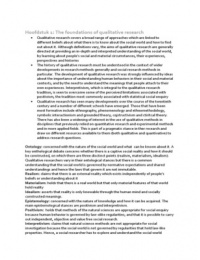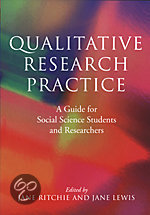Hoofdstuk 1: The foundations of qualitative research
Qualitative research covers a broad range of approaches which are linked to
different beliefs about what there is to know about the social world and how to find
out about it. Although definitions vary, the aims of qualitative research are generally
directed at providing an in-depth and interpreted understanding of the social world,
by learning about people’s social and material circumstances, their experiences,
perspectives and histories
The history of qualitative research must be understood in the context of wider
developments in research methods generally and social research methods in
particular. The development of qualitative research was strongly influenced by ideas
about the importance of understanding human behaviors in their social and material
contexts; and by the need to understand the meanings that people attach to their
own experiences. Interpretivism, which is integral to the qualitative research
tradition, is seen to overcome some of the perceived limitations associated with
positivism, the tradition most commonly associated with statistical social enquiry
Qualitative research has seen many developments over the course of the twentieth
century and a number of different schools have emerged. Those that have been
most formative include ethnography, phenomenology and ethnomethodology,
symbolic interactionism and grounded theory, cojstructivism and ctiritcal theory.
There has also been a widening of interest in the use of qualitative methods in
disciplines that previously relied on quantitative research and experimental methods
and in more applied fields. This is part of a pragmatic stance in ther research and
draw on different resources available to them (both qualitative and quantivative) to
address research questions.
Ontology: concerned with the nature of the social world and what can be known about it. A
key onthological debate concerns whether there is a captive social reality and how it should
be constructed, on which there are three disctinct points (realism, materialism, idealism).
Qualitative researchers vary in their ontological stances but there is a common
understanding that the social world is governed by normative expectations and shared
understandings and hence the laws that govern it are not immutable.
Realism: claims that there is an external reality which exists independently of people’s
beliefs or understanding about it
Materialism: holds that there is a real world but that only material features of that world
hold reality
Idealism: asserts that reality is only knowable through the human mind and socially
constructed meanings.
Epistemology: concerned with the nature of knowledge and how it can be acquired. The
main epistemological stances are positivism and interpretivism.
Positivism: holds that methods of the natural sciences are appropriate for social enquiry
because human behavior is governed by law-0like regularities; and that it is possible to carry
out independent, objective and value free social research.
Interpretivism: claims that natural science methods are not appropriate for social
investigation because the social world is not governed by regularities that hold law-like
properties. Hence, a social researcher has to explore and understand the social world
, thorugh the participants’ and their own perspectives; and explanations can only be offered
at the level of meaning rather than cause. Qualitative research is largely associated with
interpretivism.
Induction: looks for patterns and associations derived from observations of the world.
Deduction: generates propositions and hypotheses theoretically through a logically derived
process.
Hoofdstuk 2: The applications of qualitative research methods
Until the latter part of the twentieth century the use of qualitative methods was
muych more evident in research that was concerned with developing social theory
than in more applied settings. This was particylarly so in social policy research where
there had been some resistance to threating qualitative research findings as
evidence. While there has been considerable growth in the use of qualitative
research within this sector, its potential is still felt to be underutilized
A broad classification of the functions of research is described, based on the nature
of the information or understanding it brings. This is categorized as:
o Contextual research which describes the form or nature of what exists
o Evaluative research, appraising the effectiveness of what exists
o Generative research, aiding the development of theories, strategies or
actions
Qualitative research, like statistical enquiry, has a specific role to play in each of
these functions
There are circumstances in which qualitative research may be the sole or principal
method needed to address a research question. These are centrally related to the
nature of the research information or evidence required. There are also factors
related to the subject matter under investigation, specifically where it is ill defined or
not well understood; deeply rooted; complex; specialist; delicate, intangible or
sensitive
Approaches to collecting qualitative data can be very broadly divided into two
groups:
o Those that focus on naturally occurring data (for example, observation,
documentary analysis, discourse analysis)
o And those that generate data through the interventions of the research (for
example, narrative accounts, interviews, focus groups)
Each approach and the methods within it yields data of specific kinds and will be
suited to different kinds of research objectives
The potential for combining qualitative and quantitative research is considerable.
Several authors have provided useful frames of reference for optimizing the
strengths of the two approaches in harness. Each of these suggests possible
sequential relationships that may exist between the conduct of qualitative and
quantitative. Qualitative research may precede statistical enquiry, may accompany
statistical investigation or may be used in some form of follow up study. Each mode
of linkage offers a number of different roles for qualitative research. But, when using
qualitative and quantitative research in harness, it is important to recognize that
each offers a differnet way of knowing about the world and it should not be






